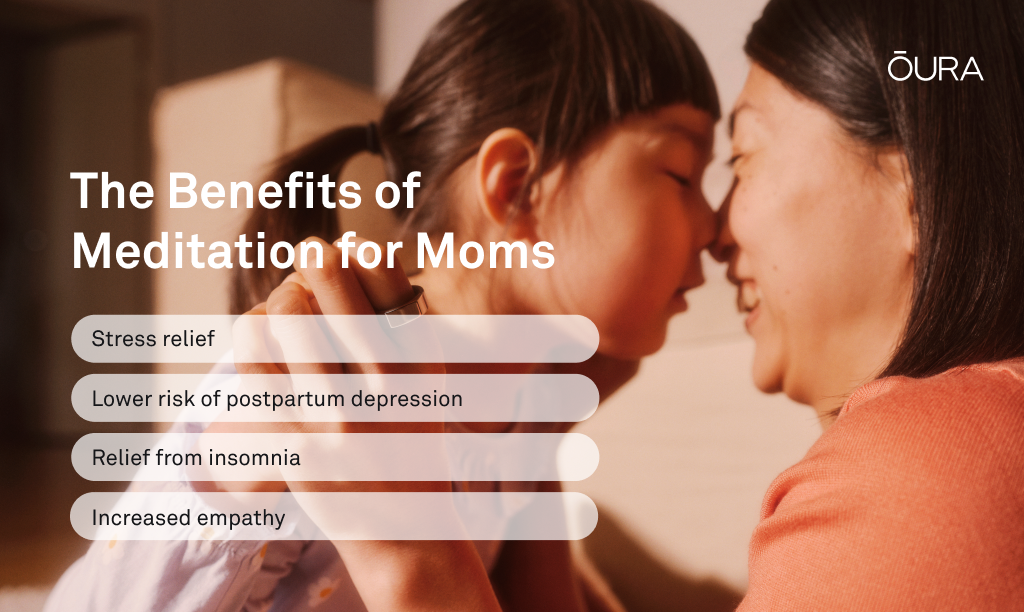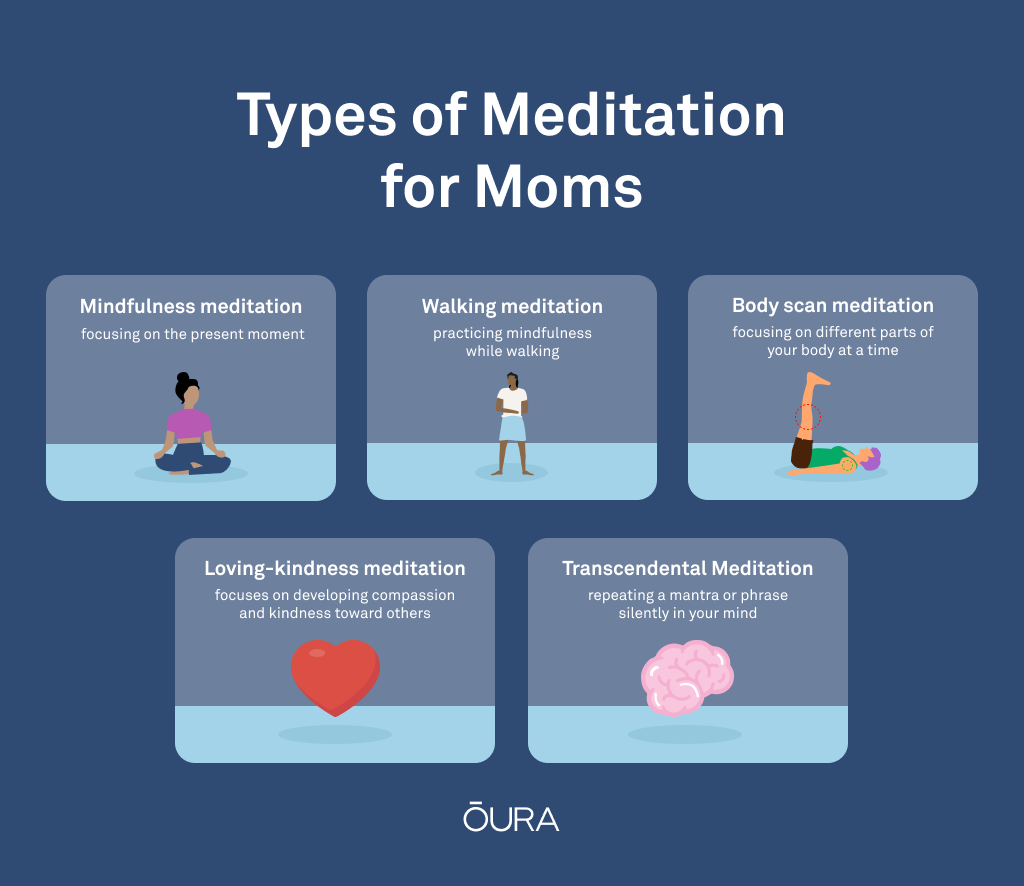Becoming a mother is a beautiful, transformative experience, but it’s not without challenges. A 2019 study confirmed what mothers everywhere have always known: Being a mom comes with a big side-helping of sleep deprivation—six years of sleep deprivation, to be precise.
While there’s no quick fix, building in short, restorative practices like meditation can help. Research shows that regular meditation supports stress relief, emotional balance, and better sleep—all of which benefit both you and your baby.
| Member Tip: Access over 70 guided meditations within Explore content in your Oura App. Otherwise, scroll down for a selection of our best meditation audios for moms. These are suitable for both beginners and experienced meditators. |
Key Benefits of Meditation for Mothers

Whether you’re pregnant, newly postpartum, or navigating toddlerhood, meditation offers tangible benefits:
Meditation Can Help Regulate Stress
Daily life can be stressful—especially for moms who, according to research, spend more time juggling work and family responsibilities than fathers do. New mothers are particularly vulnerable to stress due to hormonal fluctuations, sleep deprivation, and the constant demands of early parenting.
Meditation and mindfulness can be effective in relieving stress and helping moms calm down so they can finally get some rest. Meditation helps regulate your nervous system, reduce cortisol (the stress hormone), and promote feelings of calm.
| Member Tip: Oura tracks your daily Stress, which can be viewed on the Stress graph on the Oura App. This metric takes into consideration your heart rate variability (HRV), heart rate, body temperature, and other stress-related biometrics to give you insight into your physiological stress. |
Meditation May Lower Your Risk of Postpartum Depression
Several studies show that mindfulness and meditation during pregnancy and postpartum can support mental well-being and reduce the risk of depression. One study found that practicing mindfulness during early pregnancy helped new mothers manage the emotional transition more effectively—and even reduced symptoms of postpartum depression.
| Member Tip: Track your pregnancy in the Oura App with Pregnancy Insights, and get trimester-by-trimester guidance on your body’s changes and symptoms. |
Meditation Can Help You Sleep Better
Mindfulness meditation has been shown to ease insomnia and improve sleep quality, particularly among those with sleep disturbances. When practiced regularly, it can help you fall asleep faster, stay asleep longer, and wake feeling more refreshed—something every mom can appreciate.
Meditation May Make You a More Empathetic Parent
Research has shown that mothers with higher levels of empathy are more sensitive to their children’s needs and more capable of creating “an intimate, multi-responsive atmosphere” while caring for their infants.
Practices like loving-kindness meditation and compassion meditation have been shown to increase empathy, which can strengthen the parent-child bond and help you approach motherhood with more patience and presence.
5 Meditations for Mothers (Plus Free Audios)

There are many types of meditation out there—explore different ones to find what works best for you. Below are five effective types of meditation to try.
| Member Tip: Oura integrates with Open, a leading mindfulness platform, combining your sleep and recovery data with expert-led breathwork, meditation, movement, and sound. Exclusive Offer for Oura Members: Start your subscription with Open and get your first 30 days free with code OURA. Offer available until May 20, 2026. |
Mindfulness Meditation
This practice involves focusing on the present moment—typically using the breath as your anchor. Mindfulness helps you stay centered, even when things around you feel chaotic (yes, even when your child is throwing a tantrum in the middle of a parking lot!).
Contrary to popular belief, mindfulness isn’t about “clearing your mind” or eliminating thoughts. Your brain will wander—that’s normal. The goal is simply to notice where your attention is, and gently bring it back.
Walking Meditation
If sitting still isn’t your thing—or you’re on the move with a stroller—walking meditation might be a better fit. Walk slowly and focus on your steps, breath, and surroundings. It’s about being present, not perfect.
Body Scan Meditation
This technique guides your awareness through your body, one part at a time. It’s especially helpful for releasing physical tension—something many new moms carry in the shoulders, back, and jaw. This technique is often used in other practices like yoga nidra (also known as non-sleep deep rest).
READ MORE: What Is Non-Sleep Deep Rest (NSDR)?
Loving-Kindness Meditation
Loving-kindness meditation (also known as metta meditation) typically involves silently repeating phrases that express goodwill, compassion, and love—first to yourself, then gradually to others (loved ones, acquaintances, and even difficult people). It’s a powerful practice for cultivating emotional resilience and deepening your bond with your child.
 For Yourself:
For Yourself:
- “May I be patient with myself and my child.”
- “May I trust my instincts.”
- “May my child grow in love and safety.”
For Your Child:
- “May you be happy.”
- “May you be strong and healthy.”
- “May you feel safe, loved, and at peace.”
For All Beings:
- “May all beings everywhere be happy.”
- “May all beings be free from harm.”
- “May all beings live with peace and ease.”
Guided Loving-Kindness Meditation
Transcendental Meditation
Traditional Transcendental Meditation (TM) involves silently repeating a personalized mantra—typically a Sanskrit sound—assigned by a certified TM teacher. These mantras are chosen to be non-meaningful, allowing the mind to settle into a deeply restful state without conscious effort or association. TM is typically practiced for 15–20 minutes twice a day while seated comfortably with eyes closed.
If you’re not trained in TM, you can still benefit from a similar style of mantra meditation by using a simple, calming word or phrase. These aren’t technically TM mantras, but they can support emotional balance and stress relief in the same spirit.
Examples of grounding affirmations you can repeat silently during meditation include:
-
I am calm and capable.
-
I am safe and loved.
-
I release what I can’t control.
-
I return to the present moment.
These phrases can help you anchor your attention and create a sense of inner stillness—especially during emotionally intense moments.
Transcendental Meditation Mantra for Grounding
Make Meditation Part of Your Self-Care Routine with Oura

Whether you’re navigating pregnancy, sleepless nights, or the emotional rollercoaster of parenting, meditation offers a moment of calm in the chaos. Here are a few simple ways to build it into your day:
- Start your morning with a 5–10 minute mindfulness session to set the tone for a calmer day. Access Explore content within the Oura App to choose a guided or unguided meditation and pair it with your favorite soundscape.
- Take a midday reset during nap time or work breaks. Even a short body scan or breathing practice can help regulate your nervous system. Track these sessions in Oura and watch your HRV, resting heart rate, and temperature variation shift in real time.
READ MORE: Your Path to Inner Peace: 10 Ways to Improve Vagal Tone & Reset Your Nervous System - Make meditation part of your wind-down routine. Choose a calming practice—like loving-kindness or gratitude meditation—before bed. Then check your Oura Sleep Score the next morning to see how your new habit is impacting your sleep quality.
- Use the Tags feature to track your sessions and notice patterns over time. You may find that certain meditations—like walking or body scan—have a more calming effect on your physiology.
- Anchor meditation to an existing routine. Try meditating right after brushing your teeth, before nursing, or while rocking your baby to sleep. Small, consistent cues make it easier to build lasting habits.




